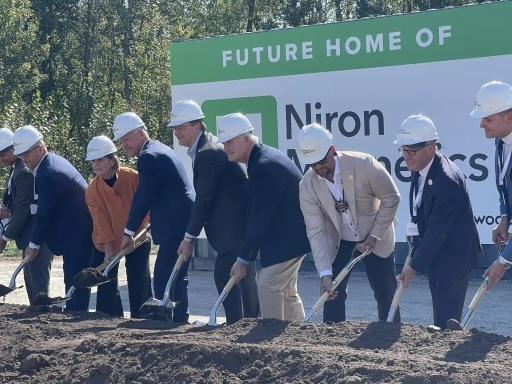
The Minnesota Department of Employment and Economic Development (DEED) has awarded $69 million from the Minnesota Forward Fund (MFF) to four business expansion and job training projects. The projects are expected to directly create 215 new jobs, provide job training to more than 800 Minnesotans and leverage more than $353 million in outside investment.
“The Minnesota Forward Fund is a tool that DEED can utilize to attract businesses to launch and grow here, especially in exciting, emerging industries,” said DEED Commissioner Matt Varilek. “I'm excited about these projects and their positive long-lasting economic impacts – both our expanding businesses and our workforce training partners in the semiconductor industry.”
The Minnesota Forward Fund is a DEED program to facilitate private investment that supports business attraction and expansion in existing and new industries in Minnesota, also providing projects with state match funding required by federal programs like the Consolidated Appropriations and CHIPS Act. The Forward Fund also offers educational grants up to $5 million to support the development and deployment of workforce training programs for providers partnering with semiconductor manufacturers.
New MFF projects are below:
Niron Magnetics, Inc., Sartell - $10,000,000
Niron Magnetics, Inc., produces powerful permanent magnets that are uniquely free of rare earth minerals, used in speakers, sensors, motors, cellphones, cars and more. Founded in Minnesota in 2013, the groundbreaking technology used to create the nanoparticle iron nitride permanent magnets was born at the University of Minnesota and is the first new magnetic material in over 40 years to use readily available, domestically sourced commodity materials—iron and nitrogen. Niron’s Iron Nitride-based permanent magnets reduce the environmental impacts of traditional rare-earth magnet mining, processing and manufacturing, and ensure a stable and sustainable supply chain, 100% domestically sourced. The project will construct a new 190,000-square-foot facility in Sartell to produce up to 1,500 tons of permanent magnets annually in 2027.
The total project cost is $169.7 million and is anticipated to create 175 new jobs.
North Wind Test, LLC, Rosemount - $49,950,000
North Wind Test, LLC, is a Minnesota-based national aerospace engineering research, development and test services company with specialized experience ranging from low subsonic to hypersonic speeds. With roots in the aerospace industry and in Minnesota since 1952, the company has been a part of the community for more than 70 years. In partnership with the University of Minnesota, North Wind will construct and develop the Minnesota Aerospace Complex (MAC) in Rosemount, a dedicated facility focused on advancing the United States’ hypersonic ground testing, modeling and simulation capabilities. Once completed, the MAC will serve as the country’s premier aerospace complex for hypersonic system research, development and testing.
The cost for the initial phase of the MAC is approximately $191.5 million and is anticipated to create 40 new jobs.
Hennepin Technical College, Brooklyn Park and Eden Prairie - $4,147,500
Hennepin Technical College, part of the Minnesota State system, offers Associates of Science and Associates of Applied Sciences degrees to its approximately 6,000 enrolled students in Brooklyn Park and Eden Prairie. Hennepin Tech will use MFF funding to create a microelectronics manufacturing training pipeline for students. By expanding and enhancing the college’s automation robotics program through new equipment and additional training space, the program will be able to serve more than 700 students and create highly skilled professionals in the semiconductor and microelectronics manufacturing industry over the course of 10 years.
The total program cost is $8.29 million. Hennepin Tech will provide $4.06 million in funding and semiconductor industry sponsors will provide $87,500 in matching scholarship funds.
University of St. Thomas, St. Paul - $5,000,000
The University of St. Thomas (UST), a private university in St. Paul with an enrollment of more than 9,000 students, will use MFF funding to establish the Minnesota Semiconductor Artificial Intelligence (AI) Hub. The hub—in collaboration with manufacturers Seagate and Skywater Technology, and MFF recipient Polar Semiconductor —will use AI to improve semiconductor manufacturing. The program will also establish graduate curriculum related to smart manufacturing with the goal of creating a pipeline of over 120 highly skilled professionals adept at leveraging AI and data science in semiconductor manufacturing.
The total program cost is $10.8 million. UST will provide $254,520 in scholarships and industry sponsors will provide $5.58 million in engineering and equipment time.
DEED has previously awarded $125 million from the Minnesota Forward Fund to companies like BioMADE and Polar Semiconductor, leveraging more than $657 million in investment and creating 185 jobs.
